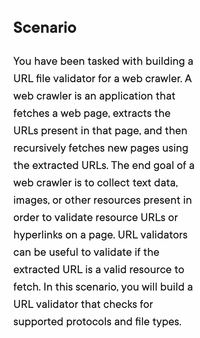
Database System Concepts
7th Edition
ISBN: 9780078022159
Author: Abraham Silberschatz Professor, Henry F. Korth, S. Sudarshan
Publisher: McGraw-Hill Education
expand_more
expand_more
format_list_bulleted
Concept explainers
Question
can you please double-check this code? thank you!
![Angela Marie v
«
CENGAGE MINDTAP
Q Search this course
4 My Home
Module Lab Assessment 2: Resource URL Validator
Tasks
main.py
main2.py
Courses
1 def validate_url(url):
O Catalog and Study Tools
Create two lists of strings - ... >
2
"I"Validates the given url passed as string.
3
А-Z
BE Rental Options
4
4
Arguments:
Write the conditions to
url
String, A valid url should be of form <Protocol>://<hostmain>
- -
return a Boolean value of
College Success Tips
6
True if the URL is valid, and
[http, https, ftp]
string
[.html, .csv, .docx]
7
Protocol =
Career Success Tips
False if either the
8
Hostname =
Protocol or the File
Fileinfo
%D
2 Help
extension is not valid.
10
IL I||
valid_protocols = ['http', 'https', 'ftp']
valid_fileinfo = ['.html', '.csv', '.docx']
11
Q Give Feedback
12
This task will be manually gr..
13
url_split = url.split('://')
= False
isFileValid = False
for x in valid_protocols:
if x in url_split[0]
14
15
isProtocolValid
16
17
18
19
isFileValid = True
20
for x in valid_fileinfo:
if x in url_split[1]:
21
22
23
isFileValid = True
24
return(isProtocolValid and isFileValid)
input ("Enter an URL: ")
print(validate_url(url))
25
26
url
%D
27
28
Run checks
D Submit 62%
LO](https://content.bartleby.com/qna-images/question/92524007-eb79-4716-97da-6681fe12a787/9ce0ec1f-2e07-41d8-b931-fdecad144593/lgxore_thumbnail.png)
Transcribed Image Text:Angela Marie v
«
CENGAGE MINDTAP
Q Search this course
4 My Home
Module Lab Assessment 2: Resource URL Validator
Tasks
main.py
main2.py
Courses
1 def validate_url(url):
O Catalog and Study Tools
Create two lists of strings - ... >
2
"I"Validates the given url passed as string.
3
А-Z
BE Rental Options
4
4
Arguments:
Write the conditions to
url
String, A valid url should be of form <Protocol>://<hostmain>
- -
return a Boolean value of
College Success Tips
6
True if the URL is valid, and
[http, https, ftp]
string
[.html, .csv, .docx]
7
Protocol =
Career Success Tips
False if either the
8
Hostname =
Protocol or the File
Fileinfo
%D
2 Help
extension is not valid.
10
IL I||
valid_protocols = ['http', 'https', 'ftp']
valid_fileinfo = ['.html', '.csv', '.docx']
11
Q Give Feedback
12
This task will be manually gr..
13
url_split = url.split('://')
= False
isFileValid = False
for x in valid_protocols:
if x in url_split[0]
14
15
isProtocolValid
16
17
18
19
isFileValid = True
20
for x in valid_fileinfo:
if x in url_split[1]:
21
22
23
isFileValid = True
24
return(isProtocolValid and isFileValid)
input ("Enter an URL: ")
print(validate_url(url))
25
26
url
%D
27
28
Run checks
D Submit 62%
LO

Transcribed Image Text:Scenario
You have been tasked with building a
URL file validator for a web crawler. A
web crawler is an application that
fetches a web page, extracts the
URLS present in that page, and then
recursively fetches new pages using
the extracted URLS. The end goal of a
web crawler is to collect text data,
images, or other resources present in
order to validate resource URLS or
hyperlinks on a page. URL validators
can be useful to validate if the
extracted URL is a valid resource to
fetch. In this scenario, you will build a
URL validator that checks for
supported protocols and file types.
Expert Solution
arrow_forward
Step 1
in given code is right but may be some errors because :
========================================================
Here i describe errors:
1.line 17:
x is not difine
Trending nowThis is a popular solution!
Step by stepSolved in 2 steps

Knowledge Booster
Learn more about
Need a deep-dive on the concept behind this application? Look no further. Learn more about this topic, computer-science and related others by exploring similar questions and additional content below.Similar questions
- write a response to the following prompt. Your prompt should quote from Blown to Bits 253-257, and be at minimum 4 paragraphs. Is there a risk of government censorship in the United States, or is this just a problem elsewhere?arrow_forwardWhat is the check digit (d) for the for the following MasterCard number? 5310 6275 7512 804darrow_forwardAnswer the last one pleasearrow_forward
- Are all the 56 bits of the DES key used an equal number of time in the Ki? Specify, for each of the Ki, which bits are not used.arrow_forwardWhat is the difference between absolute and locatable code?arrow_forwardFollowing the example, please break this cipher: c=6642328489179330732282037747645 n=17058317327334907783258193953123 Please use screenshots to demonstrate the intermediate steps and results. [screenshot]arrow_forward
arrow_back_ios
arrow_forward_ios
Recommended textbooks for you
 Database System ConceptsComputer ScienceISBN:9780078022159Author:Abraham Silberschatz Professor, Henry F. Korth, S. SudarshanPublisher:McGraw-Hill Education
Database System ConceptsComputer ScienceISBN:9780078022159Author:Abraham Silberschatz Professor, Henry F. Korth, S. SudarshanPublisher:McGraw-Hill Education Starting Out with Python (4th Edition)Computer ScienceISBN:9780134444321Author:Tony GaddisPublisher:PEARSON
Starting Out with Python (4th Edition)Computer ScienceISBN:9780134444321Author:Tony GaddisPublisher:PEARSON Digital Fundamentals (11th Edition)Computer ScienceISBN:9780132737968Author:Thomas L. FloydPublisher:PEARSON
Digital Fundamentals (11th Edition)Computer ScienceISBN:9780132737968Author:Thomas L. FloydPublisher:PEARSON C How to Program (8th Edition)Computer ScienceISBN:9780133976892Author:Paul J. Deitel, Harvey DeitelPublisher:PEARSON
C How to Program (8th Edition)Computer ScienceISBN:9780133976892Author:Paul J. Deitel, Harvey DeitelPublisher:PEARSON Database Systems: Design, Implementation, & Manag...Computer ScienceISBN:9781337627900Author:Carlos Coronel, Steven MorrisPublisher:Cengage Learning
Database Systems: Design, Implementation, & Manag...Computer ScienceISBN:9781337627900Author:Carlos Coronel, Steven MorrisPublisher:Cengage Learning Programmable Logic ControllersComputer ScienceISBN:9780073373843Author:Frank D. PetruzellaPublisher:McGraw-Hill Education
Programmable Logic ControllersComputer ScienceISBN:9780073373843Author:Frank D. PetruzellaPublisher:McGraw-Hill Education

Database System Concepts
Computer Science
ISBN:9780078022159
Author:Abraham Silberschatz Professor, Henry F. Korth, S. Sudarshan
Publisher:McGraw-Hill Education

Starting Out with Python (4th Edition)
Computer Science
ISBN:9780134444321
Author:Tony Gaddis
Publisher:PEARSON

Digital Fundamentals (11th Edition)
Computer Science
ISBN:9780132737968
Author:Thomas L. Floyd
Publisher:PEARSON

C How to Program (8th Edition)
Computer Science
ISBN:9780133976892
Author:Paul J. Deitel, Harvey Deitel
Publisher:PEARSON

Database Systems: Design, Implementation, & Manag...
Computer Science
ISBN:9781337627900
Author:Carlos Coronel, Steven Morris
Publisher:Cengage Learning

Programmable Logic Controllers
Computer Science
ISBN:9780073373843
Author:Frank D. Petruzella
Publisher:McGraw-Hill Education